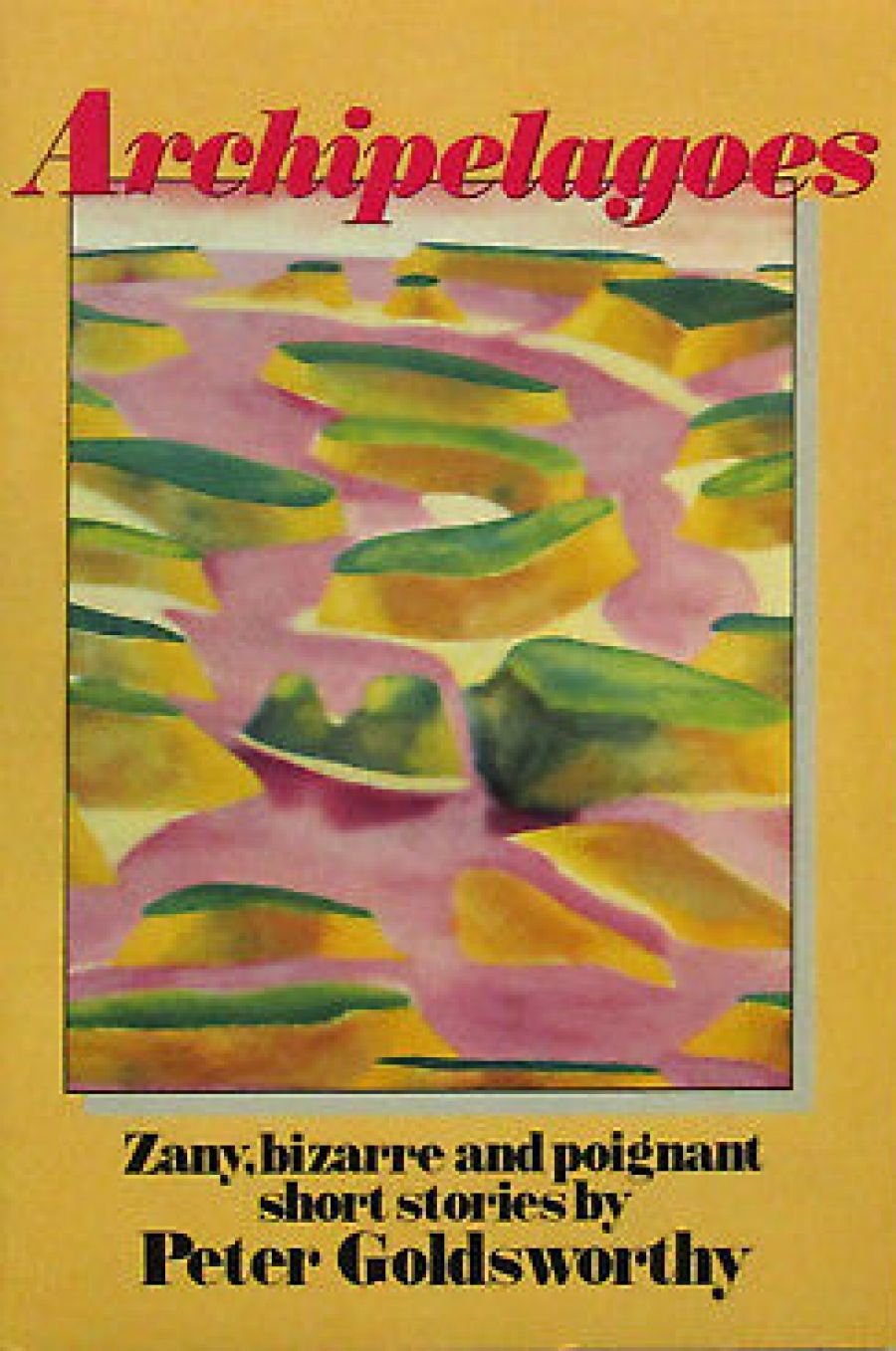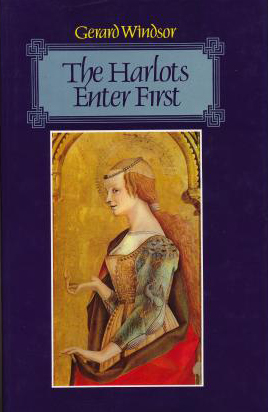
- Free Article: No
- Contents Category: Poetry
- Review Article: Yes
- Online Only: No
- Custom Highlight Text:
It is comparatively rare for a new writer to bring out his first two collections in the one year, and even more rare that one should be a collection of verse and the other of short stories. Yet this is exactly what Peter Goldsworthy has done. His name will be unfamiliar to many, but those who regularly read literary magazines will have come across his stories and poems before and he will undoubtedly be heard of again.
- Book 1 Title: Archipelagoes
- Book 1 Biblio: A&R, $6.95 pb, 108 pp
- Book 2 Title: The Harlots Enter First
- Book 2 Biblio: Hale & Iremonger, $15.95 hb, $8.95 pb, 159 pp
- Book 2 Cover Small (400 x 600):

- Book 2 Cover (800 x 1200):

- Book 2 Cover Path (no longer required): images/1_Meta/March_2020/Meta/md22552645169.jpg
The stories are brief glimpses into other people’s lives and experiences. They are economically plotted and often wryly funny, sometimes markedly ironic. The writing is spare, entirely suitable for the ‘rattling good yarn’ which is concerned with observable facts and actions, and most often requires a laconic narrator whose casual tone of voice is achieved by verbless sentences, as the opening sentences of ‘Memoirs of a small “m” marxist’ reveal:
I met her walking the streets, so to speak. Or marching them, anyway. It was one of the last protest marches of the war – maybe the very last. The Last Riot in Adelaide. One of those spring days when protest was so tremendously enjoyable. The sky clear, the sun blaring like a megaphone, the righteousness thick on the ground. A festival – the war itself almost forgotten in the revelry.
At the march, the young man meets a girl who seems to be on his wavelength. They shack up together, then slowly drift apart as the girl takes up yoga and meditation, fails to sit for exams because ‘she’s moved beyond those definitions of success’. He moves into the spare room, rarely sees her, and is preparing to move altogether when she announces she is pregnant.
I moved out the next day – into a renovated cottage in North Adelaide. Bluestone on the outside, white walls and Picasso prints inside.
We never met again, and I made no inquiries about the child – if there really was one. I wasn’t interested in custody – in dirty nappies, sleepless nights, messy fingers on the furnishings.
It probably wasn’t mine, anyway.
The stories are always short and to the point, following more in the tradition of Maupassant than Chekhov, but for all their effortless professionalism and the mildness of their subtleties they make rewarding reading.
Goldsworthy is a thirty-one-year-old doctor of medicine in South Australia, which may account for the objectivity and plain style of his narratives: in many of his stories he is the diagnostician who recounts the symptoms and ends up by announcing the affliction. His poems are quite different, more personal and more emotional, as in the second section of ‘Grandpa’s Elegy’:
The man I knew
lived in a drugged autumn
a spare-room banishment
spentplaying model trains,
coughing and farting
among motorbike magazines,and walking grandchildren
to the crossing, the express
dieselling through a maze
of Largactil and memories.O jazzplayer of legend,
psychotic and bikie,
however did you die
of old age?
In the most fully achieved poems, Goldsworthy balances the cadences of his rhythmical structures against original and striking images to startling effect. In his short poem ‘Hands’, the first stanza is:
Hand is the correct word
for fisted and knuckly things
the body’s most noble proletariat
happy in their word or not unhappy
The fifth and final stanza reads:
Hand is the word
reaching across the limits of words
a frontier of touch in the silence.
For the most part his writing is spare yet dense with ideas, emotions, and startling but apposite imagery. There are flashes of wry humour but otherwise the poems have little in common with the stories although two of them, ‘Yorke Peninsula’ and ‘Encounter Bay’, have won prizes in literary competitions.
Here is, as they say, a new writer, but it would be wrong to describe his work as ‘promising’. It is much more than that: it is poised, confident and, for the most part, persuasive. These early works are nothing to be ashamed of though I feel certain that his best work is still to come.
Gerard Windsor’s first book, The Harlots Enter First, is a very attractive publication to look at, so much so that, with its handsome cover and large and clear type, it predisposes the reader to think well of the contents. It isn’t often that a publisher goes to such pains with a new and unknown writer, but Windsor is well worth the effort; his writing is assured, dense, allusive, sometimes parabolic, and at other times phantastic, but always revelatory.
Windsor uses words sparely but deftly in the manner of a magical weaver of tales. The element of mystery in so many of the fourteen stories in this book comes from the manner of telling – much more is being told than is immediately apparent on the smooth surface. For example, the first story ‘Tales of the Anzacs, 1918, retold to the children’, in fifteen very short segments, parodies the rhythmic patterns and sometimes the words of well-known children’s stories and nursery rhymes:
II
The Australian soldier, for all his humanity,
Was poor on religion, and worse on profanity.
Which nobody minds, but it is disconcerting
That he liked pissing off, if not quite deserting.
This follows segment I, the form of which parodies in prose the rhyme ‘Who killed Cock Robin?’ and offers a satirical view of the death of Cavalry Captain Baron Manfried von Richthofen, ending with:
Who tolled the bell? We, said the Hun, stepping up his salvoes, scattering the Diggers. We made our gongs of iron sound right across his funeral ground.
Oh yes, all forms of life, on all sorts of fronts, fell crying and cursing in their impolite ways at the death (and its subsequent ballsup) of the Cavalry Captain.
The opportunities for irony and for no-nonsense satire lie in the structure of this story which contains, among its many riches, a neat dart aimed directly at C.E.W. Bean, the Australian historian of World War I and automatically (until now, that is) an inviolable sacred cow.
Irish-Australians come under attack in one story, the relationship between the church, Irish heroes, and Ireland itself is pilloried in another. A lady spinster’s quaint idealistic notions of love and romance are stripped away to reveal an impetuous, adventurous and gallant woman in ‘Miss Kerr’. ‘Voyage d’amour’ wittily exposes lustful male passengers on an ocean cruise … I could go on and on, but the foregoing has surely made it clear that nothing I can say can really offer any substitute for reading the stories themselves. They are written by a man with a startling imagination and a love of language, a craftsman in the best sense, something of a philosopher if not a cynic.
And to think this is his first book!


Comments powered by CComment